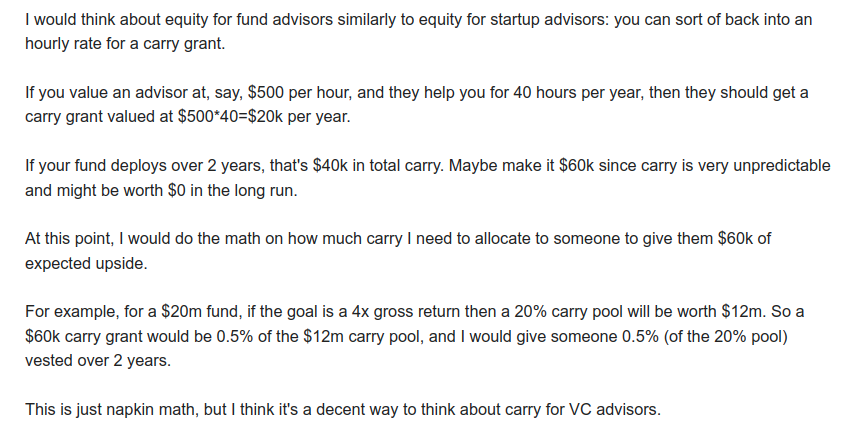There will always be debate on whether or not advisors are helpful to startups.
Just as many in Silicon Valley hold disdain for MBA degrees (while still having them!) the same sentiment applies to startup advisors. Many of the best angel and venture investors I know have been advisors to early-stage startups: both company and advisor benefitted. I also know that more often that not when I see advisors in slide decks, I roll my eyes.
There are no universal truths in startups. The key IMO is finding alignment, i.e., a balance of trading equity (market standard comp terms) for contributions (defining the advisor’s jobs to be done).
Advisors typically get involved with companies early on, filling gaps in knowledge or relationships. A great advisor can help founders see around corners and identify unknown and unknowns. They often help with introductions to capital, customers, or roll up their sleeves with in hard skill areas. Seth Levine has a great blog post on the role of advisors.
There are two main types of equity compensation offered to advisors: restricted stock awards (RSAs) and stock options. Advisory agreements often have a two year vesting schedule, reduced from the common four year vest for employees. Advisory shares typically vesting monthly, with no cliff.
Having a “successful” advisor relationship typically comes down to alignment.
Founders and advisors need to be aligned on:
- The role and expectations of the advisor (i.e., the jobs to be done)
- The structure of the relationship (equity grants and vesting schedule)
- Communications (how the two parties will engage)
- Relationship evolution (companies evolve, needs change, priorities shift)
The most aligned relationships I have seen is when the advisor is also an angel investor.
Notes:
- True advisors don’t ask for “free” equity
- Bias to advisors with actual startup experience (i.e., not academia)
- Bias to advisor with hard skills (i.e., help you would pay cash for, could you afford it)
Advisor Agreements & Relationship Structures
There are also two ways I’ve seen successful relationships structured:
1) Traditional Approach: 1-3 advisors papered with a standard advisor agreement
→ See FAST Agreement
2) Micro Equity Approach: Micro equity grants exchanged for specific contributions
→ See Cabal
Advisor Compensation Data
With a traditional two-year vest relationship, most advisors should not receive more that 0.50% (with 0.25% being more common).
Here is median equity grant given to startup advisors in 2023
- Pre-seed: 0.225%
- Seed: 0.129%
- Series A: 0.068%







